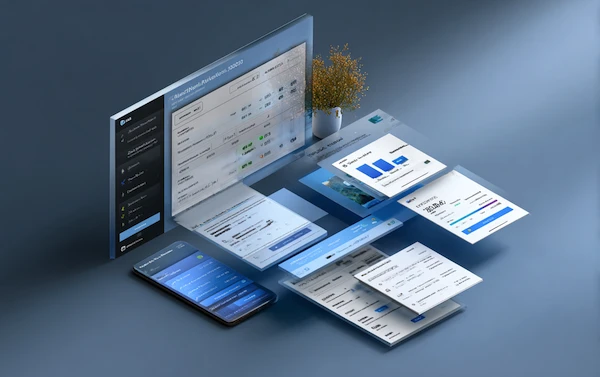Coming Up
What is Automation Software?
Automation software refers to tools and platforms that enable the automation of tasks, processes, and workflows in business operations. It reduces manual effort by using technology to carry out repetitive tasks, freeing employees to focus on higher-value work.
Automation software typically involves integrating various applications, running scripts, or utilizing bots to handle tasks. These systems can range from simple task automation tools to advanced platforms powered by artificial intelligence (AI) and machine learning (ML).
Why is Automation Software Important?
Automation software is essential because it increases efficiency, reduces human error, and ensures consistency in task execution. Organizations use automation tools to save time, cut costs, and enhance productivity. By automating repetitive processes, employees can focus on more strategic tasks, which can boost innovation and improve customer satisfaction. Additionally, automation helps in scaling business processes as companies grow, making it easier to handle increased workloads without proportionally increasing labor costs.
What are the Benefits of Automation Software?
Automation software offers numerous advantages, including:
- Time Savings: Automation tools handle repetitive tasks in less time than humans, enabling quicker task completion.
- Cost Reduction: Automating processes reduces labor costs and operational inefficiencies, improving the bottom line.
- Improved Accuracy: Automation minimizes the risk of human error, particularly in data-heavy processes like finance and accounting.
- Enhanced Productivity: Employees can dedicate more time to creative and analytical work, fostering innovation.
- Scalability: Automation software supports scaling operations without the need to increase staff, ensuring long-term growth.
- Better Compliance: Automation ensures that workflows adhere to industry regulations and standards consistently, reducing compliance risks.
What are the Types of Automation Software?
Automation software comes in various forms, each catering to different business needs. Here are some common types of automation software:
- Robotic Process Automation (RPA): RPA automates rule-based, repetitive tasks like data entry or report generation by mimicking human interactions with software systems.
- Business Process Management (BPM): BPM helps organizations automate and optimize business processes by integrating human and machine workflows.
- Artificial Intelligence Automation: AI automation tools can learn from past data, enabling them to make decisions and improve processes over time. AI-driven systems can handle complex tasks like customer service chatbots or predictive maintenance.
- Task Automation Tools: These tools automate simple, repetitive tasks like email responses, task assignments, or data manipulation.
- Workflow Automation Software: Workflow tools streamline complex multi-step processes, ensuring that tasks move smoothly between departments or team members.
What are the Challenges of Implementing Automation Software?
While automation software offers many benefits, its implementation is not without challenges. Organizations must prepare for potential roadblocks that could arise during setup and use:
- High Initial Costs: Although automation can lead to cost savings in the long term, the initial setup costs can be high, particularly for advanced platforms involving AI or machine learning.
- Integration Complexity: Integrating automation software with existing systems can be complex, especially in large organizations with legacy systems.
- Change Management: Employees may resist automation due to fear of job displacement or lack of understanding of how it will improve their workflows.
- Maintenance and Monitoring: Automated processes need regular monitoring and updates to ensure they run efficiently. Maintenance is particularly important as businesses evolve and new tasks arise.
- Data Security: Automating sensitive business processes requires robust security measures to protect data, especially in finance, healthcare, and other regulated industries.
How Does Automation Software Work?
Automation software functions by performing predefined tasks based on rules, triggers, or conditions. For example, in RPA, bots follow scripts or workflows to complete tasks that would otherwise require manual input. Workflow automation software like Zapier or ClickUp helps teams create automated workflows by setting triggers, such as sending an email when a project status changes. AI-driven automation tools take this further by learning from past data and improving process efficiency through machine learning algorithms.
What to Look for in Automation Software?
When selecting automation software, organizations should consider the following:
- Ease of Use: The software should have an intuitive interface, ideally with drag-and-drop functionality, to allow non-technical users to build workflows.
- Integration Capabilities: Check if the tool integrates with your existing applications and systems.
- Scalability: Ensure the software can grow with your business and handle increased workloads as needed.
- Security Features: For industries handling sensitive data, strong security protocols and compliance with regulatory standards are essential.
- Support and Documentation: Reliable customer support and thorough documentation make implementation and troubleshooting easier.
Use Cases of Automation Software
Automation software can be applied across various departments and industries. Here are some examples of how businesses are leveraging automation:
- Accounts Payable Automation: Automation software helps streamline the invoicing process, ensuring that payments are processed on time without manual input.
- HR Onboarding: Automating the onboarding process helps HR departments save time by automatically generating contracts, assigning training tasks, and scheduling interviews.
- Customer Support: AI-powered chatbots can handle common customer queries, freeing up customer service teams to handle more complex issues.
- Data Reconciliation: Automated reconciliation tools compare financial records from different systems to ensure accuracy, making month-end close faster and more reliable.
Boost Efficiency with Solvexia’s Automation Software
Solvexia provides powerful automation solutions for finance and business processes, offering an intuitive platform that enables companies to automate workflows, streamline reconciliations, and improve overall efficiency. Solvexia’s financial automation tools are particularly beneficial for businesses looking to optimize complex financial tasks such as payment and rebate calculations and expense analytics, offering real-time processing and reporting.
For businesses that want to explore automation in finance, Solvexia offers a range of solutions that can be tailored to specific needs. The platform integrates with existing systems and offers a no-code interface, making it accessible even for non-technical users. Explore Solvexia’s financial automation solution to learn how automation can transform your financial operations.
.svg)





























